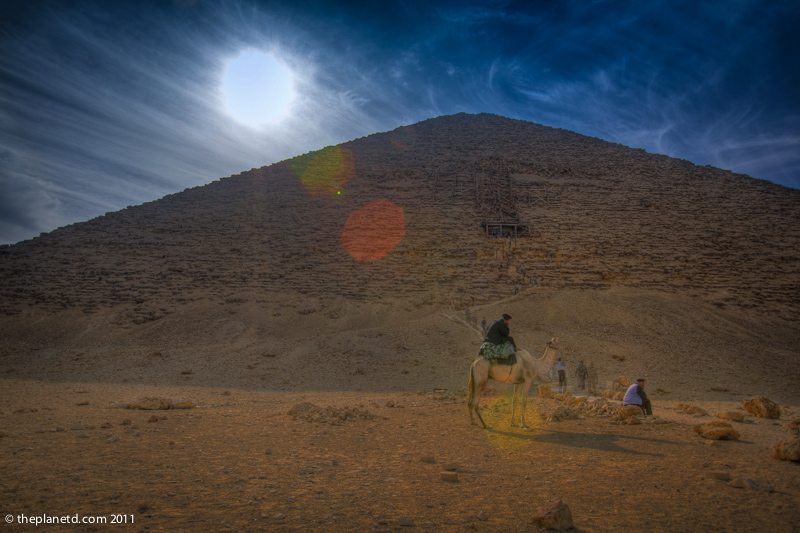Red Pyramid Egypt
Before visiting the Red Pyramid of Dahshur, I was unaware of its existence. Our guide, Maha, expressed that the Red Pyramid is her favorite pyramid in Egypt, so I anticipated something remarkable upon our arrival.
The Red Pyramid is the fourth largest pyramid in Egypt. Situated 40 km outside of Cairo, the drive felt prolonged due to the city’s notorious traffic. For those curious about interesting facts, check this Fun Facts About Egypt.
Given the atrocious traffic, it would be wise to hire a driver for a day. While we have cycled through Cairo during our adventure from Cairo to Cape Town, I wouldn’t have the courage to drive in the city myself.
History of the Red Pyramid
Upon our arrival at the Red Pyramid, we found ourselves completely alone, providing us the freedom to explore this monumental site without distractions. Located within the vast burial complex of Dahshur, we also had a panoramic view of the Bent Pyramid.
The Bent Pyramid of Egypt
Often regarded as the first attempt at constructing a smooth-sided pyramid, the Bent Pyramid is noted for its engineering challenges. Despite this, it has stood the test of time, displaying a distinctive appearance compared to other Egyptian pyramids, with its impressively curved sides.
After constructing the Bent Pyramid, Pharaoh Sneferu (2613-2589 BCE) perfected the design that defines the iconic pyramids we recognize today.
Why Visit the Red Pyramid?
One notable aspect of Dahshur is the absence of crowds, allowing for peaceful exploration and stunning photo opportunities in a tranquil setting. You might encounter local camel riders attempting to sell photographs, but overall, it’s a serene experience.
Upon entering the pyramid, we dealt with no additional fees, unlike the Pyramids of Giza. We ascended halfway up the ancient structure—an experience unique to Dahshur—affording us the chance to descend into the depths of the pyramid through a narrow passageway.
The air filled with an overwhelming scent, which sparked my imagination about the site’s past. Once we exited the tunnel, I was awestruck by the expansive chamber we entered. The craftsmanship is stunning, showcasing the precision required to assemble these stone blocks, resulting in a perfectly smooth ceiling.
The pyramid seems to consist of two contrasting elements: the rough exterior stones and the polished interior slabs.
Unfortunately, photography was prohibited inside, and I regretted not sneaking my iPhone to capture a few images. However, I believe the interior is best experienced in person. For a glimpse, take a look at these photographs from Guardian.net, which showcase the interior exquisitely.
As we explored the complex within the surrounding desert, I realized that we could have easily spent much longer admiring the Red Pyramid from various perspectives.
Interestingly, we were unable to get close to the Bent Pyramid, possibly due to time constraints or it being closed. Nonetheless, we captured some distant photos for memory’s sake.
Among the pyramids, I find myself agreeing with our guide, Maha, that the Red Pyramid holds a special place in my heart.
This site evokes a sense of adventure reminiscent of Indiana Jones as you navigate its tunnels in solitude, absorbing the cool atmosphere and imagining the experiences of early explorers.
If you are considering a trip to Egypt, ensure to include this remarkable site in your itinerary along with the Pyramids of Giza—you won’t be disappointed!




